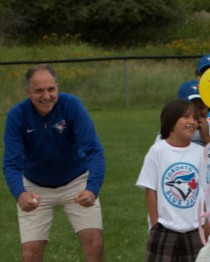Robert Witchel the Executive Director of Jays Care Foundation
As Blue Jay Fever sweeps across Toronto, it’s only fitting that we can profile the Purple Sheep behind the charitable arm of Canada’s baseball team- Robert Witchel. From a successful career in the the private sector to experiences with the Sick Kids Foundation, Right To Play and now the Jays Care Foundation, Robert has been able to leverage his understanding of the corporate and nonprofit worlds. We love his advice to focus on experiences (not jobs) and to always keep trying and learning.
What does your job entail including what a typical day might be like?
The beauty of this job is that there are no typical days. We meet with donors, program partners, Toronto Blue Jays staff, the team’s corporate partners, alumni and players, our friends and partners at Rogers and Sportsnet, and, most importantly, the children and youth with whom we are fortunate enough to work.
Can you briefly describe your career path and how you got your current job?
I worked in the private sector for the majority of my career and had the good fortune to work in Canada, the United States and the United Kingdom before returning to Canada. Upon our return my family decided that we would like to support SickKids and through that connection we became involved with SickKids Foundation. When I first sat down to meet with the then CEO of the Foundation to discuss all things philanthropic, I was amazed when he offered me a job.
After working with SickKids for a few years I took a role with Right To Play running their Canadian operation. Over four years we grew the team from five people to 30, established a very successful program in Canada focused on indigenous youth and quadrupled revenue. Following my time at Right To Play I provided consulting services to a number of different organizations before stepping into my current role at Jays Care Foundation.
What’s the coolest part about your job and what’s the biggest challenge?
The coolest thing about my job is being able to positively impact the lives of thousands of children all across the country. As the charitable arm of Canada’s baseball team we have the opportunity to leverage our brand and our assets to inspire communities. The biggest challenge is managing priorities, setting goals for programmatic outcomes and then measuring our impact.
What advice would you give to a job seeker looking for meaningful work?
The most difficult thing is deciding what you want to do and in which direction you want your career to go. If you don’t have a clear idea, that’s ok, but make sure that you gain experience that will set you up for success down the road when things come into focus.
I have always had a bias towards action and agree with a quote that has been attributed to Conrad Hilton: “Success seems to be connected with action. Successful people keep moving. They make mistakes, but they don’t quit.”
To me, “meaningful” is a subjective term. As long as you are doing things and are constantly trying and learning, I believe you are building a foundation that will serve you well when you find your calling.
The most difficult thing is deciding what you want to do and in which direction you want your career to go. If you don’t have a clear idea, that’s ok, but make sure that you gain experience that will set you up for success down the road when things come into focus.
What can you identify as the biggest opportunity in your sector right now?
I believe that partnerships are the way forward for non-profit organizations that are trying to solve complex problems. Working together and mobilizing a variety of skills, expertise and resources is, in my opinion, the quickest, most effective avenue to turning the corner for communities struggling to achieve good outcomes for their constituents.





No Comment